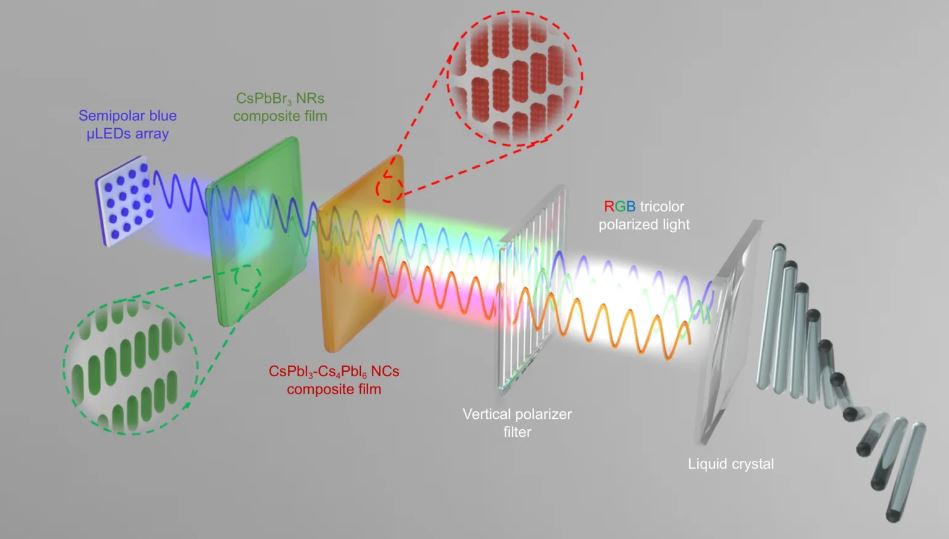Researchers from Xiamen University have unveiled a self-polarizing RGB device that harnesses the power of semipolar MicroLEDs and perovskite-in-polymer films to drastically improve the energy efficiency of LCD backlights. This innovative technology tackles the long-standing issue of light intensity loss in traditional polarizing methods, which can filter out up to 50% of vertical polarization.

Structure of an LCD based on semipolar blue μLEDs excite anisotropic perovskite NCs as backlight.
(Source: Opto-Electronic Advances)
The team, led by Associate Professor Tingzhu Wu, leveraged the exceptional photoluminescence and color purity of halide perovskite nanocrystals within anisotropic structures to achieve polarized emission without significant light loss. By employing blue semipolar MicroLEDs as the excitation source for color-conversion layers made from stretched composite films of green and red perovskite nanocrystals, the researchers have engineered a device capable of emitting self-polarized light across the primary colors of red, green, and blue (RGB).
The device’s architecture not only addresses the inefficiencies of current polarizing techniques but also circumvents the challenges associated with synthesizing red-emitting perovskite nanostructures, which often suffer from morphological instability. The stretched composite films exhibit strong polarized emission thanks to their aligned wire structures, further enhanced by encapsulation in a high-dielectric constant material for the red components.
This self-polarizing RGB device has achieved high efficiency and stability,. The green and red perovskite layers maintain their polarization properties under stretch, offering a practical solution for scalable luminescence applications. The device demonstrates a wide color gamut, exceeding standard benchmarks with 137.2% of NTSC and 102.5% of Rec. 2020, alongside impressive Degree of Linear Polarization (DOLP) values across all three colors.
The researchers’ work presents a promising approach to achieving self-polarized RGB emission for LCD backlighting applications. With further research and development, this innovative approach could potentially revolutionize the LCD backlighting industry and contribute to the development of more energy-efficient and high-performance displays.
TrendForce 2023 Micro LED Market Trend and Technology Cost Analysis
Release Date: 31 May / 30 November 2023
Language: Traditional Chinese / English
Format: PDF
Page: 160 / Year
If you would like to know more details , please contact:











